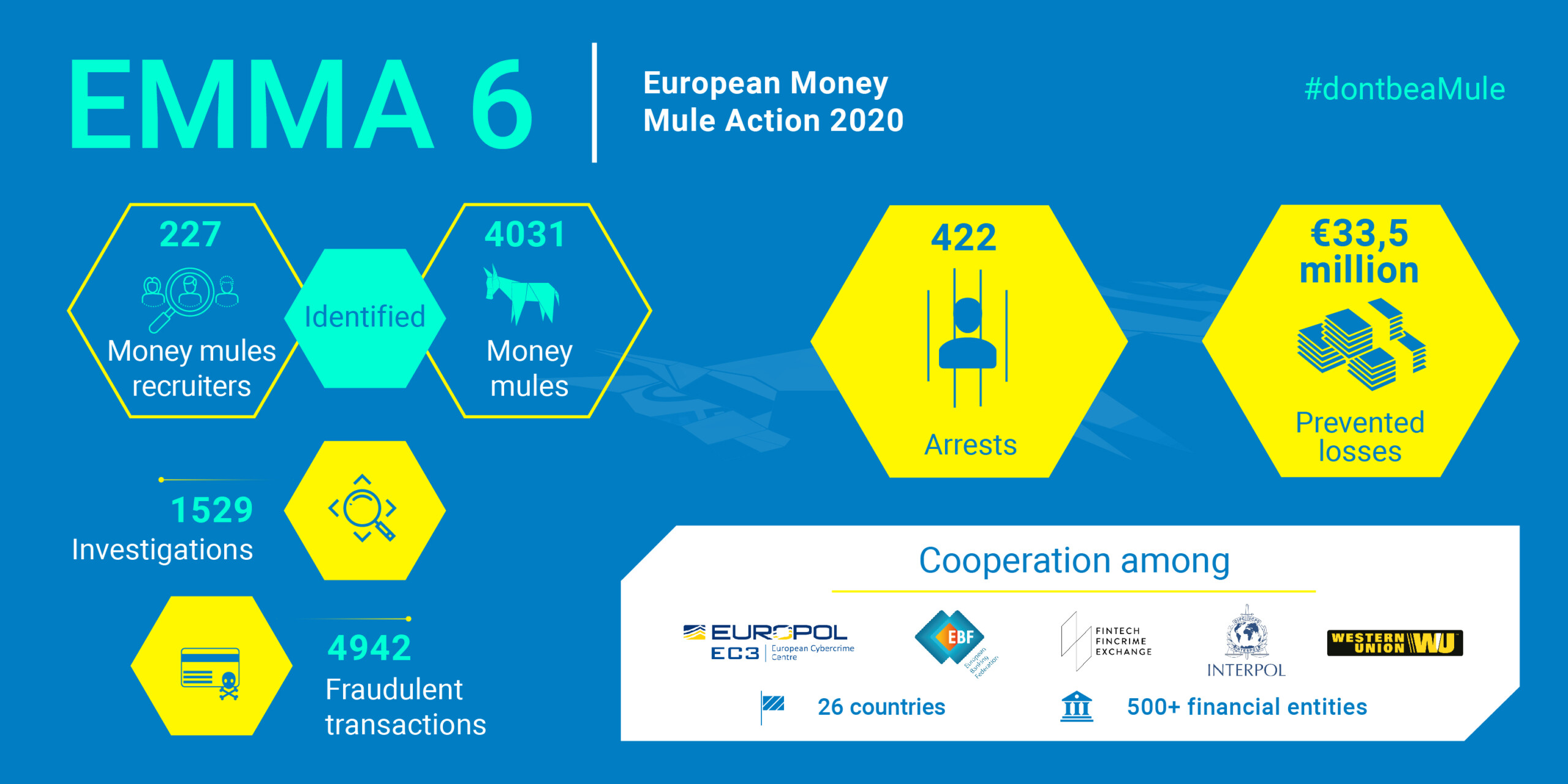
SCARS Institute’s Encyclopedia of Scams™ Published Continuously for 25 Years

Europe Continues The Global Crackdown On Money Mules
Law Enforcement Is Losing Patience With Mules!
Mules are the lifeline for transnational criminal enterprise
422 Arrested And 4,031 Money Mules Identified In Global Crackdown On Money Laundering
In Europe this year, law enforcement authorities from 26 countries and Europol announced the results of the European Money Mule Action ‘EMMA 6’, a worldwide operation against money mule schemes.
Between September and November 2020, EMMA 6 was carried out for the sixth consecutive year with the support of the European Banking Federation (EBF), FinTech FinCrime Exchange, INTERPOL, and Western Union. As a result, 4 031 money mules were identified alongside 227 money mule recruiters, and 422 individuals were arrested worldwide.
During the span of the operation, 1 529 criminal investigations were initiated. With the support of the private sector including more than 500 banks and financial institutions, 4 942 fraudulent money mule transactions were identified, preventing a total loss estimated at €33.5 million.
DON’T BECOME A LINK IN THE MONEY LAUNDERING CHAIN
Money mules are individuals who, often unwittingly, have been recruited by criminal organizations as money laundering agents to hide the origin of ill-gotten money. Unaware that they are engaging in criminal activities, and tricked by the promise of easy money, mules transfer stolen funds between accounts, often in different countries, on behalf of others. In exchange, they receive a commission for their services.
While mules are recruited via numerous routes such as direct contact or through email, criminals are more and more turning to social media to recruit new accomplices, through the advertisement of fake jobs offers (e.g. ‘money transfer agents’), online pop-up ads and instant messaging applications. Although some COVID-19 related cases have been reported, payment process compromise and romance scams continue to be the most recurrent schemes. The use of cryptocurrencies by money mules is also on the rise.
Europol and EU law enforcement authorities together with international partners and financial institutions will launch the #DontBeaMule campaign to raise awareness among the public on the risks of money mule schemes.
The campaign, promoted internationally by competent authorities, will aim to inform the public about how criminals operate, how they can protect themselves and what to do if they become involved.
What do you risk as a money mule?
- physical attacks or threats if you don’t continue to cooperate with the criminals;
- a prison sentence, fine or community service;
- a criminal record that could seriously affect the rest of your life such as never being able to secure a mortgage or open a bank account.
What can you do?
If you think you might be used as a mule, act now before it is too late: stop transferring money and notify your bank and your national police immediately. Do not simply return it and hope for the best!
EUROPOL SUPPORT
Operation EMMA is part of an ongoing project conducted under the umbrella of the EMPACT Cybercrime Payment Fraud Operational Action Plan, designed to combat online and payment card fraud, led by the Netherlands.
Building on the success of the previous EMMA operations, EMMA 6 saw the participation of law enforcement authorities from:
- Australia
- Austria
- Belgium
- Bulgaria
- Croatia
- Cyprus
- Czechia
- Estonia
- Finland
- Greece
- Hungary
- Ireland
- Italy
- Lithuania
- Moldova
- Netherlands
- Poland
- Portugal
- Romania
- Spain
- Sweden
- Switzerland
- Slovenia
- Slovakia
- United Kingdom
- United States
During this yearlong operation, Europol supported the coordination and preparation of operational meetings, delivered analysis, and facilitated the exchange of information between law enforcement authorities and private partners. Furthermore, Europol coordinated the awareness campaign with the participating countries.
Headquartered in The Hague, the Netherlands, Europol supports the 27 EU Member States in their fight against terrorism, cybercrime and other serious and organized forms of crime. They also work with many non-EU partner states and international organizations. From its various threat assessments to its intelligence-gathering and operational activities, Europol has the tools and resources it needs to do its part in making Europe safer.
![empact_full_colour_0[1] Europe Continues The Global Crackdown On Money Mules empact full colour 01](https://romancescamsnow.com/wp-content/uploads/2020/12/empact-full-colour-01.png)
In 2010 the European Union set up a four-year Policy Cycle to ensure greater continuity in the fight against serious international and organized crime. In 2017 the Council of the EU decided to continue the EU Policy Cycle for the 2018 – 2021 period. It aims to tackle the most significant threats posed by organized and serious international crime to the EU. This is achieved by improving and strengthening cooperation between the relevant services of EU Member States, institutions, and agencies, as well as non-EU countries and organizations, including the private sector where relevant. Cybercrime is one of the priorities for the Policy Cycle.
TAGS: SCARS, EMMA 6, Eurpol, Money Mule Crackdown, Information About Scams, Anti-Scam, Scams, Scammers, Fraudsters, Cybercrime, Crybercriminals, Romance Scams, Scam Victims, EMPACT, Interpol, Western Union
PLEASE SHARE OUR ARTICLES WITH YOUR FRIENDS & FAMILY
HELP OTHERS STAY SAFE ONLINE – YOUR KNOWLEDGE CAN MAKE THE DIFFERENCE!
THE NEXT VICTIM MIGHT BE YOUR OWN FAMILY MEMBER OR BEST FRIEND!
By the SCARS™ Editorial Team
Society of Citizens Against Relationship Scams Inc.
A Worldwide Crime Victims Assistance & Crime Prevention Nonprofit Organization Headquartered In Miami Florida USA & Monterrey NL Mexico, with Partners In More Than 60 Countries
To Learn More, Volunteer, or Donate Visit: www.AgainstScams.org
Contact Us: Contact@AgainstScams.org
-/ 30 /-
What do you think about this?
Please share your thoughts in a comment below!
Table of Contents
- Law Enforcement Is Losing Patience With Mules!
- DON’T BECOME A LINK IN THE MONEY LAUNDERING CHAIN
- What do you risk as a money mule?
- What can you do?
- EUROPOL SUPPORT
- PLEASE SHARE OUR ARTICLES WITH YOUR FRIENDS & FAMILY
- By the SCARS™ Editorial Team
Society of Citizens Against Relationship Scams Inc. - The Issue Of Race In Scam Reporting
Click Here To Learn More!
LEAVE A COMMENT?
Recent Comments
On Other Articles
- Arwyn Lautenschlager on Love Bombing And How Romance Scam Victims Are Forced To Feel: “I was love bombed to the point that I would do just about anything for the scammer(s). I was told…” Feb 11, 14:24
- on Dani Daniels (Kira Lee Orsag): Another Scammer’s Favorite: “You provide a valuable service! I wish more people knew about it!” Feb 10, 15:05
- on Danielle Delaunay/Danielle Genevieve – Stolen Identity/Stolen Photos – Impersonation Victim UPDATED 2024: “We highly recommend that you simply turn away form the scam and scammers, and focus on the development of a…” Feb 4, 19:47
- on The Art Of Deception: The Fundamental Principals Of Successful Deceptions – 2024: “I experienced many of the deceptive tactics that romance scammers use. I was told various stories of hardship and why…” Feb 4, 15:27
- on Danielle Delaunay/Danielle Genevieve – Stolen Identity/Stolen Photos – Impersonation Victim UPDATED 2024: “Yes, I’m in that exact situation also. “Danielle” has seriously scammed me for 3 years now. “She” (he) doesn’t know…” Feb 4, 14:58
- on An Essay on Justice and Money Recovery – 2026: “you are so right I accidentally clicked on online justice I signed an agreement for 12k upfront but cd only…” Feb 3, 08:16
- on The SCARS Institute Top 50 Celebrity Impersonation Scams – 2025: “Quora has had visits from scammers pretending to be Keanu Reeves and Paul McCartney in 2025 and 2026.” Jan 27, 17:45
- on Scam Victims Should Limit Their Exposure To Scam News & Scammer Photos: “I used to look at scammers photos all the time; however, I don’t feel the need to do it anymore.…” Jan 26, 23:19
- on After A Scam, No One Can Tell You How You Will React: “This article was very informative, my scams happened 5 years ago; however, l do remember several of those emotions and/or…” Jan 23, 17:17
- on Situational Awareness and How Trauma Makes Scam Victims Less Safe – 2024: “I need to be more observant and I am practicing situational awareness. I’m saving this article to remind me of…” Jan 21, 22:55
ARTICLE META
Important Information for New Scam Victims
- Please visit www.ScamVictimsSupport.org – a SCARS Website for New Scam Victims & Sextortion Victims
- Enroll in FREE SCARS Scam Survivor’s School now at www.SCARSeducation.org
- Please visit www.ScamPsychology.org – to more fully understand the psychological concepts involved in scams and scam victim recovery
If you are looking for local trauma counselors please visit counseling.AgainstScams.org or join SCARS for our counseling/therapy benefit: membership.AgainstScams.org
If you need to speak with someone now, you can dial 988 or find phone numbers for crisis hotlines all around the world here: www.opencounseling.com/suicide-hotlines
A Note About Labeling!
We often use the term ‘scam victim’ in our articles, but this is a convenience to help those searching for information in search engines like Google. It is just a convenience and has no deeper meaning. If you have come through such an experience, YOU are a Survivor! It was not your fault. You are not alone! Axios!
A Question of Trust
At the SCARS Institute, we invite you to do your own research on the topics we speak about and publish, Our team investigates the subject being discussed, especially when it comes to understanding the scam victims-survivors experience. You can do Google searches but in many cases, you will have to wade through scientific papers and studies. However, remember that biases and perspectives matter and influence the outcome. Regardless, we encourage you to explore these topics as thoroughly as you can for your own awareness.
Statement About Victim Blaming
SCARS Institute articles examine different aspects of the scam victim experience, as well as those who may have been secondary victims. This work focuses on understanding victimization through the science of victimology, including common psychological and behavioral responses. The purpose is to help victims and survivors understand why these crimes occurred, reduce shame and self-blame, strengthen recovery programs and victim opportunities, and lower the risk of future victimization.
At times, these discussions may sound uncomfortable, overwhelming, or may be mistaken for blame. They are not. Scam victims are never blamed. Our goal is to explain the mechanisms of deception and the human responses that scammers exploit, and the processes that occur after the scam ends, so victims can better understand what happened to them and why it felt convincing at the time, and what the path looks like going forward.
Articles that address the psychology, neurology, physiology, and other characteristics of scams and the victim experience recognize that all people share cognitive and emotional traits that can be manipulated under the right conditions. These characteristics are not flaws. They are normal human functions that criminals deliberately exploit. Victims typically have little awareness of these mechanisms while a scam is unfolding and a very limited ability to control them. Awareness often comes only after the harm has occurred.
By explaining these processes, these articles help victims make sense of their experiences, understand common post-scam reactions, and identify ways to protect themselves moving forward. This knowledge supports recovery by replacing confusion and self-blame with clarity, context, and self-compassion.
Additional educational material on these topics is available at ScamPsychology.org – ScamsNOW.com and other SCARS Institute websites.
Psychology Disclaimer:
All articles about psychology and the human brain on this website are for information & education only
The information provided in this article is intended for educational and self-help purposes only and should not be construed as a substitute for professional therapy or counseling.
While any self-help techniques outlined herein may be beneficial for scam victims seeking to recover from their experience and move towards recovery, it is important to consult with a qualified mental health professional before initiating any course of action. Each individual’s experience and needs are unique, and what works for one person may not be suitable for another.
Additionally, any approach may not be appropriate for individuals with certain pre-existing mental health conditions or trauma histories. It is advisable to seek guidance from a licensed therapist or counselor who can provide personalized support, guidance, and treatment tailored to your specific needs.
If you are experiencing significant distress or emotional difficulties related to a scam or other traumatic event, please consult your doctor or mental health provider for appropriate care and support.
Also read our SCARS Institute Statement about Professional Care for Scam Victims – click here to go to our ScamsNOW.com website.









![To Be A Scammer? An Overview Of Scammers Fraudsters & Online Con Artists - 2024 [UPDATED] what is a scammer what-is-a-scammer](https://romancescamsnow.com/wp-content/uploads/2021/10/what-is-a-scammer.png)
![New Research Study on Stolen Valor - Military Scams - STUDY NOW COMPLETED [UPDATED] Military Impersonation Research Study New Research Study on Stolen Valor - Military Scams](https://romancescamsnow.com/wp-content/uploads/2022/03/Military-Impersonation-Research-Study.png)







Thank you for your comment. You may receive an email to follow up. We never share your data with marketers.